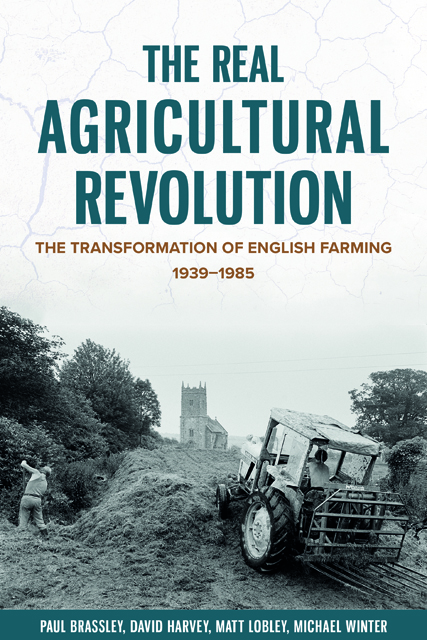Book contents
- Frontmatter
- Contents
- Figures and Tables
- Preface and Acknowledgements
- Abbreviations
- 1 Introduction: Exploring Agricultural Change
- 2 The Organisation of Agricultural Science, 1935–85
- 3 Knowledge Networks in UK Farming, 1935–85
- 4 Agricultural Policy, 1939–85
- 5 Dairy Farming
- 6 Land and Capital
- 7 Labour and Machinery
- 8 Specialisation and Expansion
- 9 The Declining Enterprises: Pigs and Poultry
- 10 Conclusions
- Bibliography
- Index
3 - Knowledge Networks in UK Farming, 1935–85
Published online by Cambridge University Press: 04 January 2024
- Frontmatter
- Contents
- Figures and Tables
- Preface and Acknowledgements
- Abbreviations
- 1 Introduction: Exploring Agricultural Change
- 2 The Organisation of Agricultural Science, 1935–85
- 3 Knowledge Networks in UK Farming, 1935–85
- 4 Agricultural Policy, 1939–85
- 5 Dairy Farming
- 6 Land and Capital
- 7 Labour and Machinery
- 8 Specialisation and Expansion
- 9 The Declining Enterprises: Pigs and Poultry
- 10 Conclusions
- Bibliography
- Index
Summary
The previous chapter identified the principal developments in the administration and funding of agricultural science and the resultant activities of agricultural scientists. This chapter explores the links between research and the agricultural industry and considers the changes in agricultural education, extension, or advice, and other means, principally various forms of media, by which farmers became aware of technical developments. It then examines the varying experiences of individual farmers and their reactions to the knowledge available to them, before finally drawing conclusions from both this chapter and chapter 2 on the impact of research and its value to the farming industry.
The Agricultural Improvement Councils and Their Successors
Many agricultural scientists and university academics had close informal links with farmers through discussion groups, meetings, and the occasional necessity to carry out research or survey work on farms, but there were also official bodies designed to foster links between scientific research and practical agriculture. In 1941, the ARC was given the same status as the Medical Research Council and the Department of Scientific and Industrial Research, which meant that its role changed from an advisory one to a duty to undertake such research as it thought fit with the resources placed at its disposal. At the same time, two AICs, one for England and Wales and one for Scotland, were established. Sir Donald Fergusson, Chairman of the England and Wales AIC, identified the different roles to be played in a letter to Sir Thomas Middleton, then Chairman of the ARC: ‘The ARC will concentrate their energies on strengthening the efficiency of the research organisation, but will not be concerned to get the results applied in practice. This will be the job of the AICs.’ Their functions were further defined in the 1942 report on agricultural research in Great Britain as keeping in touch with scientific research, advising on testing promising results for incorporation into farming practice, and expediting this process, and also advising on farming problems in need of attention from researchers. At this point in the war, there was also a Technical Development Committee, which had sub-committees in the counties, and which had apparently been established initially to solve urgent wartime problems.
- Type
- Chapter
- Information
- The Real Agricultural RevolutionThe Transformation of English Farming, 1939-1985, pp. 46 - 87Publisher: Boydell & BrewerPrint publication year: 2021



